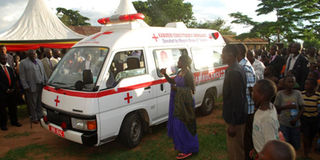Hospitals charge fuel fee for ambulance services

Donation. Residents of Kabweri County in Kibuku District receive an ambulance from Mr Mauku Mugole, a politician, in April. PHOTO BY FRED WAMBEDE
What you need to know:
- Intervention. Members of Parliament across the country have been buying ambulances to fill the health service gaps in their areas. Many existing public health centres in both rural and urban areas, have no ambulance services which complicates handling of referral cases.
- Options. Patients in rural areas who need urgent medical attention and cannot afford to pay for ambulance services have always resort to hiring boda bodas and using public means of transport which are not safe.
Mbale. Residents and leaders in Bugisu Sub-region have asked government to prevail over hospitals that are charging patients to fuel government ambulances during emergencies.
The residents allege that the charges will escalate deaths in the sub-region especially among the rural poor.
Ms Josephine Lyemu, a resident of Bududa Town Council, says she lost her mother, Esther Akello, two weeks ago after the family failed to raise Shs50,000 to fuel the ambulance to transport her from Bududa Hospital to Mbale Regional Referral Hospital.
“When my mother started experiencing labour pains, we sought ambulance services from the hospital but the driver told us to pay Shs50,000 for fuel, which we did not have,” Ms Lyemu narrates.
The deceased was a nurse at Bududa hospital.
Ms Jessica Mutenyo, another resident, says she nearly lost her mother, who had been admitted to Bududa Hospital due to lack of money to fuel the ambulance.
“We were referred to Mbale hospital but we did not have the money. We remained stranded yet her condition was deteriorating. We opted for a passenger taxi, which was cheaper but unhygienic,” she says.
Mr Denis Wanyoro, the Bulambuli District youth councillor, says the state of ambulance referral services in the sub-region is wanting.
“The hospital might have an ambulance but most times, they have no fuel and it is the patients who have to foot costs which they cannot afford,” he says.
Mr Wanyoro says besides ambulance services being costly, many rural areas in Bulambuli are inaccessible as they are characterised by poor road networks.
Limited scope
Despite receiving ambulance donations from legislators, Mr Robert Nazeba, a resident of Mbale District, says rural people are not catered for as the vehicles are only operational in urban centres and neighbouring sub-counties.
“The MPs’ ambulances do not serve hard-to-reach areas. They have not helped much to fill the gap as they claim,” he says.
Explaining the challenges faced by rural health centres, Mr Nazeba says majority of the facilities lack power.
“The health workers use torches and candles at night while attending to patients,” he says.
Ministry told to intervene
The Manjiya Member of Parliament in Bududa District, Mr John Baptist Nambeshe, however, says the Ministry of Health should quickly intervene to save lives.
“Sometimes drivers decline to take Shs50,000 and demand more. This is absolute broad day robbery and we cannot allow this to continue,” he says.
Mr Nambeshe has threatened to expose errant staff who extort money from patients.
“This must have been fought long time but the vice has continued because the local leadership is compromised with some little money. As a result, they pay a blind eye and deaf ear to tears of our mothers,” he says.
The Bududa Woman Member of Parliament, Ms Justine Khainza, says the hospitals should desist from charging patients money for free services.
“The government gives the hospitals money for fuel. Where does it go?” Ms Khainza asked.
Mr Wilson Watila says no referral patient is supposed to pay for the ambulance services since they are free and budgeted for by the district.
A nurse at Mbale Regional Referral Hospital, who spoke to Daily Monitor on condition of anonymity, said the culture of patients paying for government ambulance services is common.
“This is something that happens partly for good reasons because the hospital lacks money though it’s affecting many patients especially, the poor, who can’t afford it,” she says.
The Bududa hospital administrator, Mr Malachi Majeme, acknowledges that patients are asked to pay between Shs30,000 and Shs50,000 for ambulance services.
“We have no money, so now patients on referral are asked to contribute some money for fuel so that they can be transported to Mbale hospital,” Mr Majeme says.
Dr John Baptist Waniaye, the commissioner-in-charge of ambulance services at the Ministry of Health says ambulance services are supposed to be free of charge to patients.
“Each hospital receives primary health care non-wage grant from government and 3 per cent of that grant is supposed to cater for the referral case especially the maternal health case where we need to curb the plight that has existed from the past,” says Dr Waniaye.
He adds: “However, patients can be asked to contribute when the budget has been exhausted or funding is not enough but the charge should not be exorbitant because that would be illegal unless the authorities of the district have come up with their own health care insurance policy.”
The issues
Intervention. Members of Parliament across the country have been buying ambulances to fill the health service gaps in their areas. Many existing public health centres in both rural and urban areas, have no ambulance services which complicates handling of referral cases.
Options. Patients in rural areas who need urgent medical attention and cannot afford to pay for ambulance services have always resort to hiring boda bodas and using public means of transport which are not safe.




